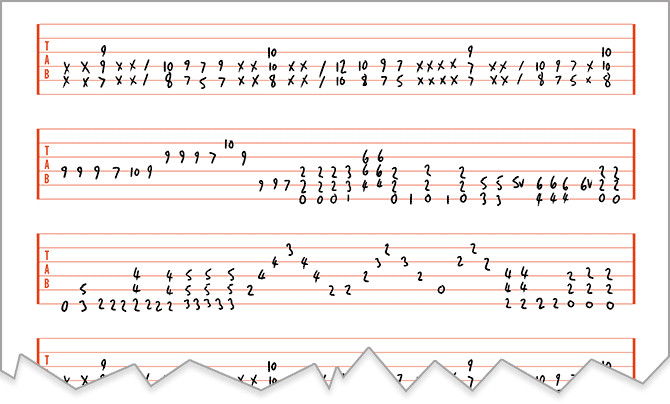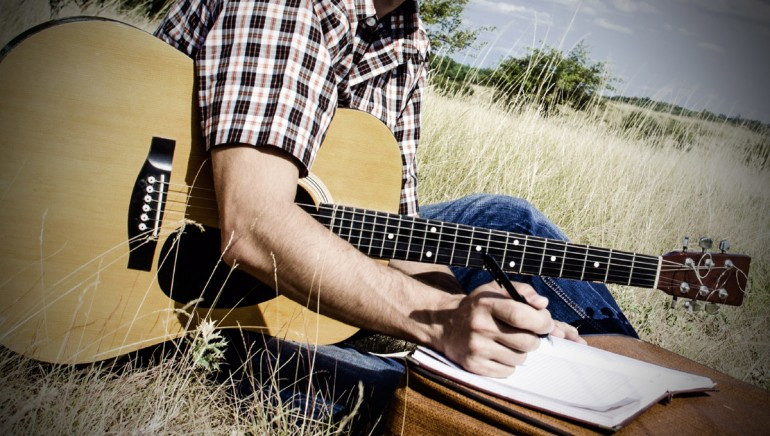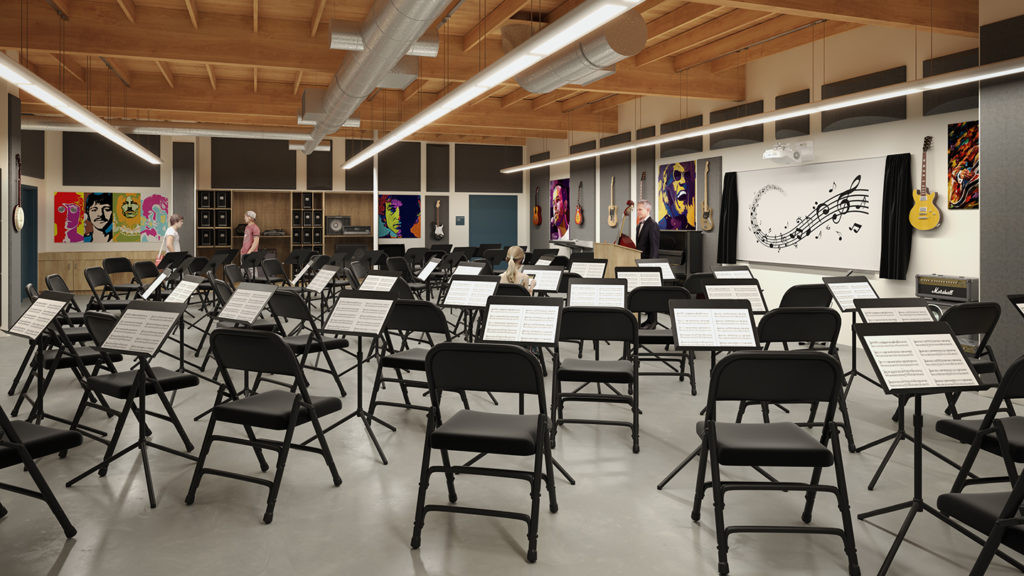The allure of learning guitar is strong, with millions in America purchasing new guitars annually, many as entry-level instruments. However, the sobering reality is that around 90% of aspiring guitarists abandon their musical journey within the first year. Back in the 1950s and 60s, learning guitar was a slower process. The late 1990s, fueled by the internet’s rise, introduced a game-changer: guitar tablature, or “tab.” While tablature itself wasn’t a novel concept, the internet made accessing and sharing tabs incredibly easy, revolutionizing how people learned to play popular songs.
Guitar tab simplifies music transcription by visually representing finger positions on the guitar fretboard. Instead of deciphering traditional sheet music, tab uses numbers on lines representing guitar strings to indicate frets. This intuitive system allows guitarists to transcribe and share songs, creating a powerful peer-to-peer learning environment.
 Example of guitar tablature
Example of guitar tablature
The internet quickly became a vast repository of guitar tabs. Websites hosting thousands of tabs sprung up rapidly. This explosion of online guitar tabs, predictably, drew the attention of the music publishing industry and their legal teams. Copyright concerns threatened to shut down this burgeoning online resource entirely.
This raises a crucial question: Is guitar tablature, arguably a “derivative work” under copyright law, something that should be restricted? Should there be a clear fair use exception for guitar tabs? And if not, why not?
Understanding Copyright Law and Derivative Works
Copyright law in the United States protects “original works of authorship,” granting authors exclusive rights over their creations. These rights include:
(1) Reproduction of the copyrighted work in copies or phonorecords;
(2) Creation of derivative works based on the copyrighted work;
(3) Distribution of copies or phonorecords of the copyrighted work to the public;
(4) Public performance of literary, musical, dramatic, and choreographic works, pantomimes, and motion pictures and other audiovisual works;
(5) Public display of literary, musical, dramatic, and choreographic works, pantomimes, and pictorial, graphic, or sculptural works;
(6) Public performance of sound recordings by means of a digital audio transmission.
In the context of guitar tabs, the most relevant right is (2): the exclusive right to prepare derivative works. A “derivative work” is legally defined as:
“A work based upon one or more preexisting works, such as a translation, musical arrangement, dramatization, fictionalization, motion picture version, sound recording, art reproduction, abridgment, condensation, or any other form in which a work may be recast, transformed, or adapted. A work consisting of editorial revisions, annotations, elaborations, or other modifications which, as a whole, represent an original work of authorship, is a “derivative work.”
 Ten foolproof ways to improve your guitar playing
Ten foolproof ways to improve your guitar playing
It’s important to recognize that music often involves two distinct copyrights: one for the sound recording (the version you hear) and another for the musical composition (the underlying song itself, also known as the “songwriting copyright”). Before guitar tabs, sheet music was the primary format for transcribing and distributing musical compositions.
The sheet music industry is a significant billion-dollar market. This revenue comes from licensing the songwriting copyright to publishers who create and sell sheet music. Sheet music is considered a derivative work of the original song. This system allows songwriters and the music industry to control and profit from derivative works. The rise of online guitar tablature posed a direct challenge to this established industry.
Guitar tabs are typically created by individuals who are not the original songwriters. They transcribe songs, often by ear, into tab format, aiming for accuracy. While the accuracy of online tabs varies, the act of transcription itself raises copyright concerns. Even without malicious intent, these user-created tabs are potentially unauthorized derivative works, creating a legal grey area.
The core legal debate revolves around whether guitar tabs are indeed “derivative works.” Arguments for this classification state that tabs are direct transcriptions of copyrighted material (either the sound recording or the musical composition). Conversely, arguments against derivative work status suggest tabs are merely informational – a form of analysis or critique that doesn’t fundamentally transform the original work.
From a creator’s perspective, transcribing a song into tablature feels like creating a derivative work. The process involves transforming a song into a different language – guitar tab – specifically to enable others (and oneself) to recreate the song. The purpose isn’t critique or analysis, but replication and performance. This leans heavily towards the “derivative work” interpretation.
Assuming guitar tabs are derivative works, the next critical question is whether “fair use” provides a legal defense against copyright infringement for online tab sharing.
Fair Use and Guitar Tabs: A Balancing Act
Copyright law isn’t absolute; it includes the doctrine of “fair use,” which allows limited use of copyrighted material without permission under certain circumstances. Fair use is permitted for purposes like “criticism, comment, news reporting, teaching (including multiple copies for classroom use), scholarship, or research.”
 A person teaching guitar in a classroom setting
A person teaching guitar in a classroom setting
Fair use analysis is highly fact-dependent, relying on a four-factor test outlined in copyright law:
(1) The purpose and character of the use, including whether such use is commercial or for non-profit educational purposes;
(2) The nature of the copyrighted work;
(3) The amount and substantiality of the portion used in relation to the copyrighted work as a whole;
(4) The effect of the use upon the potential market for or value of the copyrighted work.
This is where the conflict intensifies. Guitar tab websites and users often argue for fair use based on “teaching,” “scholarship,” and “research.” These are valid points, as tabs are undeniably educational tools. However, the music publishing industry counters that unauthorized tabs undermine the commercial market for sheet music, licensed tabs, and ultimately, the songwriter’s potential income. Both sides present seemingly valid arguments under each of the four fair use factors, leading to a complex and often intractable debate.
Copyright law aims to incentivize creativity, as enshrined in the US Constitution’s mandate to “promote the Progress of Science and useful Arts.” Authors, including songwriters, deserve to profit from their work. However, this incentive must be balanced against the public’s right to access and build upon creative works. The fair use doctrine is designed to strike this balance, but its application is rarely straightforward.
Despite the long-standing debate, there’s a notable lack of legal precedent specifically addressing guitar tabs and fair use. No known lawsuits have reached a jury verdict, and no published judicial opinions definitively clarify the legal status of guitar tabs. Legal scholars have attempted to analyze fair use in this context, but the issue remains largely unresolved in court. Consequently, major guitar tab websites have often opted for licensing agreements with the music publishing industry to mitigate legal risks.
The Evolution of the Guitar Tab Industry and Copyright Challenges
Guitar tabs surged in popularity alongside the internet boom of the 1990s. By the mid-2000s, the music industry began actively addressing online copyright infringement. Around 2005-2006, several prominent guitar tab sites received cease-and-desist letters, spearheaded by organizations like the National Music Publishers’ Association and the Music Publishers’ Association of America. Faced with potential legal action and lacking resources, many tab sites shut down.
The On-line Guitar Archive (OLGA) serves as a prime example of these copyright pressures. Founded in the early 1990s, OLGA grew into a vast archive of tabs. Despite attempts to reposition itself as a non-profit archive, OLGA ultimately removed its entire collection of 34,000 tabs in 2006 following legal threats. While OLGA briefly operated under a licensing agreement, the site eventually went offline in 2016.
Attempts to completely eradicate unauthorized guitar tabs online are likely futile. Digital copyright infringement is a persistent challenge, and complete elimination is practically impossible. The music industry, therefore, often focuses on larger platforms.
Over the years, numerous guitar tab sites have emerged and often disappeared, including OLGA, Harmony Central, GuitarTabs.com, MyGuitarTabs.com, TabCrawler.com, and MXTabs.net. Currently, Ultimate Guitar (www.ultimate-guitar.com) appears to be the dominant player, hosting over a million tabs. Ultimate Guitar has navigated copyright issues by establishing licensing agreements with rights holders and utilizing advertising revenue to cover licensing costs. Despite these agreements, some artists still restrict the publication of their tabs, and major sites generally comply with these requests.
Fair Use or Copyright Infringement? The Case for Guitar Tabs
As someone who creates and uses guitar tabs, primarily through platforms like Ultimate Guitar, the argument for fair use resonates strongly. The personal motivation for creating tabs is often rooted in ear training and improving musical understanding. Tabs become a tool for learning and playing songs, often for personal enjoyment and appreciation of the original music. Many guitarists, including hobbyists like myself, are “bedroom guitarists” – unlikely to impact the commercial market through personal use of tabs.
Guitar tabs are invaluable learning resources. For many aspiring guitarists, online tabs provide the accessibility and encouragement needed to learn and persist with the instrument. Without them, the learning curve would be steeper, potentially leading to higher dropout rates among new players.
While acknowledging the legitimate market for sheet music and officially licensed songbooks, the use of user-created tabs often complements, rather than replaces, official publications. Many musicians utilize both tabs and official sheet music, recognizing the value of each. Personal tab creation and use, and accessing freely shared tabs, seem unlikely to significantly harm the commercial sheet music market.
The core purpose of guitar tabs, for most users, aligns with personal research and learning. This differs significantly from platforms like Napster, where digital song sharing directly substituted purchasing music. Guitar tabs are not intended to replace original recordings or songwriting copyrights. Instead, they often serve as an entry point, encouraging more people to engage with music and potentially even purchase official materials later on. This aligns with the spirit of “fair use.”
However, the music industry’s considerable influence and resources often overshadow the perspectives of smaller guitar tab websites and individual users. The lack of legal precedent in this specific area likely reflects the power imbalance and the challenges of challenging established industry practices in court.
Copyright law is essential for protecting creators’ rights, but it shouldn’t hinder non-commercial, personal use of copyrighted works for learning and practice. Access to guitar tabs online promotes musical education and participation. Ideally, copyright law should encourage, not stifle, these activities. Amending copyright law to explicitly include a fair use exception for online guitar tabs could better balance the interests of creators and the public good, fostering musical learning and appreciation.
[1] https://www.quora.com/How-many-guitars-are-sold-in-the-USA-annually;
https://www.statista.com/statistics/439911/number-of-electric-guitars-sold-in-the-us/
[2] 17 U.S.C. § 102(a).
[3] 17 U.S.C. § 106.
[4] 17 U.S.C. § 101 (definitions).
[5] See generally 17 U.S.C. §§ 107-112 and 114.
[6] 17 U.S.C. § 107.
[7] U.S. Constitution, Art. I § 8, cl. 8.
[8] Looking at you, Rage Against The Machine. Not cool.

